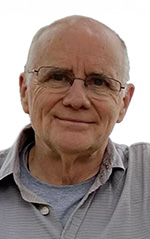In Their Own Words: An Interview with Four Foreign Service Authors
Foreign Service authors share their struggles and inspirations.
BY DAVID K. WESSEL
As evidenced by the number of entries in The Foreign Service Journal’s annual “In Their Own Write” compendium, many former and current members of the Foreign Service community have a story to tell.
Writing can be a rewarding outlet for the untapped creative talents, mental energy, and free time of Foreign Service employees and their family members while at posts abroad. I asked several authors included in the 2023 “In Their Own Write” to share the story behind their stories and explain how their writing was inspired or hindered by their Foreign Service work and lifestyle.
I spoke with Gregory E. Buford, an FS family member currently living in Turkmenistan and the author of a memoir series, Kept, based on his life at different posts; Lydia Kiesling, novelist and daughter of a retired FSO; Sarah Chapman Monahan, a Foreign Service child and current FSO spouse who writes historical young adult fiction; and Mikkela Thompson, a Foreign Service child who is a multigenre writer and a Foreign Service office management specialist.
David K. Wessel: Have you always wanted to be a writer?
Gregory E. Buford: Yes, for as long as I can remember.
Lydia Kiesling: I have always written and, I think, did want to be a writer when I was a child. During high school and young adulthood, I wasn’t really cognizant that “writer” was a sustainable profession that someone could have. I didn’t start writing in earnest until I was around 25.
Sarah Chapman Monahan: As a child, I was forever journaling and writing little stories on folded pieces of paper bound with staples. After graduating from college, I moved to Istanbul, my father’s last post before retiring, and began doing some freelance writing and editing—for the consulate newsletter, the Hilton’s magazine, little articles commissioned by Redhouse Press—whatever popped up. Just speaking native English was a perk, so some of my work involved editing things that had been written by non-native speakers: a taste of what you could do when living overseas back then.
Mikkela Thompson: Yes, at least as far back as the age of 9, when I think I may have declared it. Recently, I have been digitizing old papers belonging to my mother and grandparents. My mother kept all my writing from the first book I made, with string and glue, back when I was 6 or 7. And I didn’t stop there. It seems like I was always writing and publishing books.
Write every day, even if it’s just for a few minutes.
–Gregory Buford

Wessel: What was your first book about? What inspired you to write it?
Buford: My first book was a novel, Making Ghosts Dance, a tale of corruption and greed set within the American diplomatic community in Cambodia. I moved with my wife and three young children to Phnom Penh in 2004. Upon our arrival, I was immediately struck by Cambodia’s thriving sex industry, in general, and the prominence of sex tourism, in particular.
Most disturbing of all was the evident trafficking and prostitution of children. As the primary caregiver of three small children—including an adopted child who could pass for Cambodian—and the kind of parent who always checks for the fire exits, I found the safety of my family was no passing concern. This book, in essence, is a product of my worst nightmare.
Kiesling: My first book, The Golden State, is a novel about caregiving, toddlers, rural Northern California, right-wing extremism, and our immigration system. I had recently given birth to my first child and wanted to capture the experience of taking care of a small child in a way that didn’t fit my previous short-form freelance writing.
Monahan: I have written only one book—so far. It’s a young adult (YA) novel, but it has appeal for adults, too. It’s based on experiences I had while living in divided Berlin as a high school student in the late 1970s. A coming-of-age tale, it takes place on both sides of the Berlin Wall and portrays life in the American Sector and the impact the Cold War had on young minds. It’s also about the unique challenges of moving—leaving homes behind and creating new ones in new countries. But mostly, it’s an exciting adventure that takes place in Berlin’s unique historical setting: a walled-off island of freedom surrounded by a totalitarian state.
When I lived in Berlin, I had a diplomatic passport, so I was able to visit the East and make some East German friends who, of course, could never see where I lived. I kept in touch with one friend until, years after the fall of the wall, he came with his wife and two children to visit me in Türkiye, where I was living with my Foreign Service spouse and three children. The myriad questions posed by our curious offspring got us talking about those days, and I was intrigued by how my friend’s perspective of that period differed from mine—and how much of that chapter in history had been forgotten. It struck me as grist for a novel, inspiring me to create a story to bring those days back to life.
Thompson: In October 2013, my boss in Dhaka, who was my greatest cheerleader, asked for a book version of my blog. It was an online product, but she wanted a book. I started my blog in October 2011 at my dad’s suggestion when I was about to head out to Bangladesh. I had tried to blog in the past, in hopes of making money from it, and had failed, so I couldn’t see what I would blog about. But I started blogging, and I have blogged every week, on average, for 12 years.
My upbringing as a Foreign Service brat is fundamental to my experience of the world and my ideas about place and home.
–Lydia Kiesling

Wessel: Tell us about your journey, from idea stage to publication.
Buford: Writing the book was the easy part. Indeed, I had to write the book because of what I was seeing in Cambodia. Then I spent years trying to interest literary agents and publishers in my work, to no avail. Finally, I published the book myself through Amazon’s Kindle Direct Publishing. My only regret is that I waited so long to go that route. All my books have been published this way, and it’s paid off.
Kiesling: I started out with little vignettes that didn’t go anywhere, and then decided to leave my full-time job for a part-time job and spend a year completing a draft. I was very lucky that it worked out, and I was able to get an agent at the end of that year.
Monahan: I started writing the story when I joined a creative writing group while living in Rome, never thinking about having it published, just writing chapters to share. It was a make-believe world I dove into for fun and writing practice. During the COVID-19 pandemic, I began to edit the lengthy pages and realized that if I could polish it into a cohesive story, I could try to get it published.
So I rewrote the whole thing, edited it for flow, and began to look for a publisher. Literary agents wanted nothing to do with historical fiction for YA, especially with a first-time, out-of-nowhere, “older” author. That was discouraging. I began to research self-publishing, which seemed more challenging—and much less fun—than writing. And then I focused on small publishing firms. Finally, I began submitting my manuscript to any who were accepting my genre.
Thompson: I would get up early to work on turning my first two years of blogging into a book. I got it done in time for the embassy’s holiday bazaar, and the ambassador kindly did a photo op of him buying a copy—autographed, of course. Now, I write about what I feel like writing, but mainly I recycle material from my blog. Blurb.com was set up for printing blogs, and I still publish my books with them; but I do the e-books through Amazon’s Kindle publishing house because Blurb no longer does e-books. I may switch to something else if I find it easier.
For a nonworking spouse, I think the Foreign Service life is ideal for writing.
–Sarah Chapman Monahan

Wessel: How did being part of the Foreign Service community help during your journey?
Buford: Many members of the FS community provided me with invaluable background information and moral support throughout my journey.
Kiesling: My upbringing as a Foreign Service brat is fundamental to my experience of the world and my ideas about place and home. It is reflected in my first novel and more explicitly in my second novel, Mobility, which follows a Foreign Service brat through her adolescence and adulthood.
Monahan: I can’t say that the FS community helped per se, but the fact that I did not need to work full-time when we were overseas made the long hours spent on this questionable venture—constantly battling that internal voice asking, “Who do you think you are?”—feasible.
Thompson: Being part of the Foreign Service community is what started my book writing success. I had talked for decades about writing, but then when I got that request back in 2013, it unleashed the production process in me.
Wessel: Did your Foreign Service life hinder your writing journey in any way? If so, how?
Buford: No.
Kiesling: No, since my Foreign Service life was essentially constrained to my childhood.
Monahan: No, certainly not. I am not sure I’d ever have finished a novel had I been settled in the U.S. somewhere, working full-time. But—who knows? For a nonworking spouse, at least, I think the Foreign Service life is ideal for writing.
Thompson: Writing—no. Publishing—yes. Getting books cleared is difficult for me as a direct-hire active-duty employee. It depends very much on the whim of the public affairs officer at the embassy. So far one out of three has been successfully published when overseas. Most of the time, it is not worth the months spent going around in a bureaucratic fug. I publish on home leave now.
If this is what you want—to write, to see your name on a book, to tell a story—just do it.
–Mikkela Thompson

Wessel: What advice would you offer other aspiring Foreign Service authors?
Buford: Write every day, even if it’s just for a few minutes.
Kiesling: Starting a writing project feels very daunting, and it can take a long time before you get the confidence and momentum to really devote a lot of time to your writing. Give yourself a chance to express what you want to express, even if it feels miserable in the beginning.
Monahan: When moving to a new place, my modus operandi is to study the local language, find somewhere to volunteer, and check out writing opportunities. All these activities offer avenues to meet people and get to know a new culture.
The downside of writing is that it can come at the expense of immersing yourself in a place and ultimately, ironically, make you feel cut off and lonely. To combat this and promote progress, it’s a good idea to stick to a writing schedule. That way you will be open to other opportunities when they come along without ignoring your writing.
Getting this book written and published felt like giving birth to a manatee, but I am so glad that I persevered. People who live our lifestyle acquire unique perspectives and have much to offer others. So, if you have a compelling story idea, a knack for telling a story, and the urge to sit for hours and crank it out, give it a go!
Thompson: Like most things in life, if you really, really, really want it, go for it. Do not let anything stop you. If you don’t know what to write about, write about yourself, as that is what you know best. Write every day. Use social media as a way to force yourself to write every day. Join a writer’s group. Start with a journal or blog. Try a podcast if you can’t write it down. If you can’t get published, do it yourself.
Don’t let anyone dissuade you, whatever the reason. If this is what you want—to write, to see your name on a book, to tell a story—just do it, even if it’s just to write about how you met your partner because you think you have the greatest love story ever. Or if you want to write the sort of children’s book you wish you had read when you were a child, then do that. If you can’t find the time, then it’s not what you really, really, really want. And that’s okay, too.
When sharing or linking to FSJ articles online, which we welcome and encourage, please be sure to cite the magazine (The Foreign Service Journal) and the month and year of publication. Please check the permissions page for further details.
Read More...
- “On Writing a Book on the Foreign Service When One is in the Foreign Service” by Willard L. Beaulac, The Foreign Service Journal, January 1952
- “Writing and the Foreign Service” by Peter Kujawinski, The Foreign Service Journal, November 2017
- “On the Writing Roller Coaster” by Charles Ray, The Foreign Service Journal, November 2017
- “Memoir Writing: The Art of Telling Your Story” by Frank J. Young, The Foreign Service Journal, November 2022




